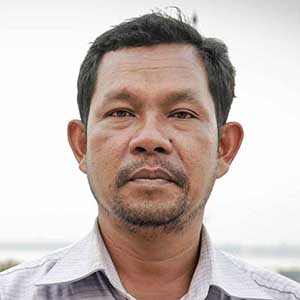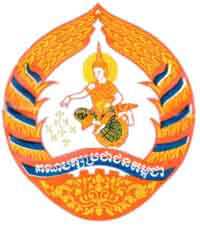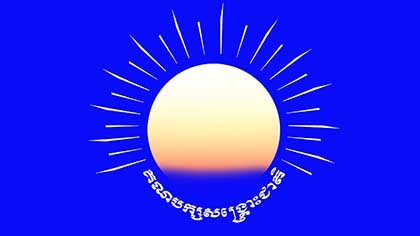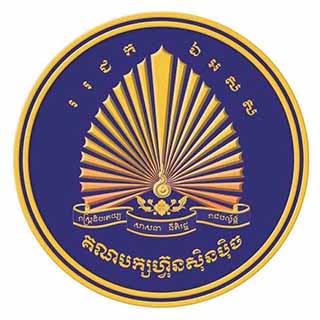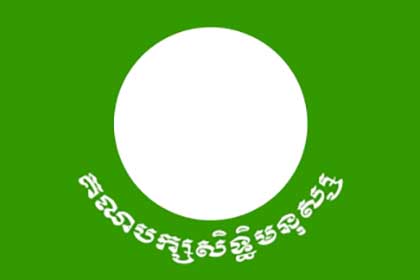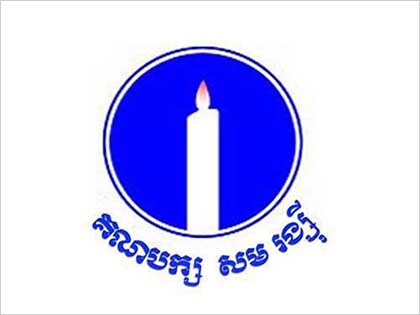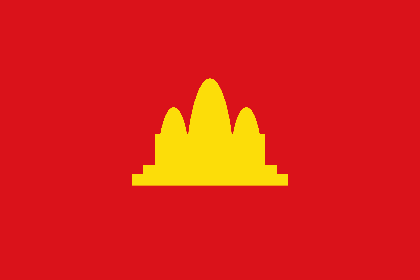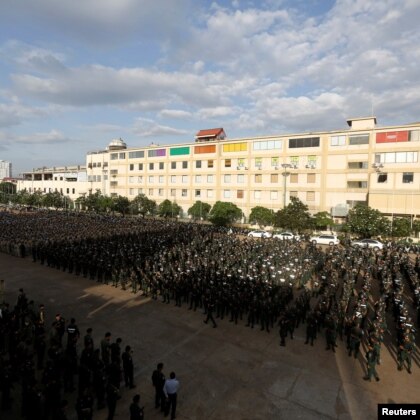
Cambodia's armed forces display anti-riot gear and assault rifles at the Olympic stadium ahead of a general election this weekend, in Phnom Penh, Cambodia, July 25, 2018. (Samrang Pring | Reuters)
Community Stories
As Election Draws Near, Ruling Party Seeks to Win War for Legitimacy
The CPP has used many slogans during its campaign, including perhaps the most ubiquitous: “A CPP Win Means the Whole of Cambodia Wins”.
Phnom Penh As Cambodia prepares for what is set to be a tense election on Sunday and despite the absence of the country’s main opposition party, the ruling Cambodian People’s Party has not rested on its laurels, maintaining a strong presence during the campaign, both on social media and in the streets.
Unlike the scenes in 2013, when tens of thousands of supporters of the opposition Cambodia National Rescue Party took to the streets, this year’s campaigning has lacked a competitive edge. But the CPP has worked hard to project the image of a healthy campaign, replete with high turnouts to pro-CPP events.
“If many people go to vote, the CPP will be able to show that there are still lots of people who support them,” says Meas Nee, a political analyst. “It is not a competitive election.”
The CNRP was banned by a Supreme Court decision in November. The government had accused the party of conspiring with foreign powers to overthrow Prime Minister Hun Sen, despite a near total lack of evidence to support the claim.
Most of the 55 opposition MPs who lost their seats after the party was dissolved have left the country, fearing arrest, but CNRP officials who remain in Cambodia say they miss the spirit of the 2013 campaign, a period of optimism and activism, while recent months have been marked by mass surveillance of dissidents and a crackdown on freedom of expression.
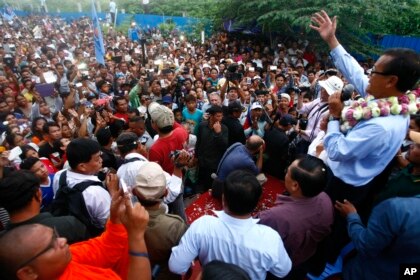
President of National Rescue Party Sam Rainsy, right, gives a speech during his tour visit to Boeung Kak lake area, in Phnom Penh, Cambodia, Monday, Aug. 5, 2013. (AP)
Voting Lessons
Ruling party officials have traveled the length and breadth of the country to campaign, including holding instructional seminars with rural voters on how to fill out their ballot forms. Only one option on the ballot is discussed: a vote for the CPP.
Videos have surfaced on social media showing ministers going door-to-door to encourage voters to support the ruling party.
Ear Sophal, a political scientist at Occidental College in Los Angeles, says the CPP wants to prevent a repeat of 2013, when only 60 percent of registered CPP members voted for the party.
“What the hell happened to the two million CPP family who didn’t vote for the CPP? They better get the message this time. You vote for us, or something will happen to you,” he said.
Ny Romduol, a former CNRP commune chief, said she was “sad that we can’t compete in the campaign this time.”
“There’s only campaigning from one party,” she said.
Nineteen other minor parties are contesting the vote, but none have the popular support that the CNRP managed to muster in 2013.
Romduol, 30, said she will boycott the vote in the absence of the CNRP, an admission that has led others to face legal action.
“We join the clean fingers campaign,” she said, referring to the boycott by the slogan given it by the CNRP. “It will not be a free and fair election. I hope the party [the CNRP] will come back … we must have the opposition party.”
An Easy Victory
The CPP has used many slogans during its campaign, including perhaps the most ubiquitous: “A CPP Win Means the Whole of Cambodia Wins”.
Hun Sen’s message to voters is that a vote for the CPP is a vote for peace, stability and the opportunities that come with economic growth. Without the CPP, he says, Cambodia could face horrors not seen since the Khmer Rouge regime ruled the country.

“They still do a big campaign because the idea here is to appear to earn their victory while having already eliminated their top enemies, and I don’t just mean the CNRP.”
Supporters of Cambodian Prime Minister Hun Sen's People's Party start a campaign in Phnom Penh, Cambodia, Saturday, July 7, 2018. (AP)
“We go to vote altogether to strengthen democracy in Cambodia to be more robust because if there is no election, there is no progress,” he said in a recent speech.
The CPP has recruited military officers, film stars, singers and comedians to join its campaign in a bid to gain mass appeal. “The CPP will win easily,” said Sophal of Occidental College. “They still do a big campaign because the idea here is to appear to earn their victory while having already eliminated their top enemies, and I don’t just mean the CNRP. It’s clear they have gone through a list of who they need to get rid of, including in the media and among NGOs.”
Pressure to Vote
Sam Rainsy, the former CNRP president, who has lived in exile since 2015, has repeatedly called on Cambodians to boycott the vote. Campaigners say the opposition was unlawfully excluded from the election, leaving anti-CPP Cambodians no choice other than to protest.
In Battambang province, several former CNRP officials have been found guilty of taking part in the campaign and will have to pay up to $5,000 in fines for posting images of themselves promoting the campaign on Facebook. The complaint also mentioned “incitement”, a serious criminal charge that has been used against numerous dissidents in recent years and can lead to years of jail time, possibly hinting at future criminal charges against the group.
Nee, the political analyst, said there was pressure on non-voters coming in many forms, but he said many Cambodians had discussed spoiling the ballot as a possible option to avoid the possible repercussions of not having inked fingers on election day.
Kung Raiya, 27, who was previously jailed after making a post on Facebook the CPP claimed was inciting a “color revolution”, said he was also taking part in the election boycott. “I feel a bit worried, but it is my right since there is no CNRP,” he said.
Rhona Smith, the U.N. rights envoy to Cambodia, has also raised concerns over voter intimidation.
‘Fake Election’
Members of the former opposition have said the election is “fake” and that voting for any party would be a win for the CPP and Hun Sen.

Cambodian Prime Minister Hun Sen waves to supporters during his Cambodian People's Party's campaign in Phnom Penh, Cambodia, Saturday, July 7, 2018. (AP)
“If you go to vote, it means that Cambodia will be in ruin because this fake news will just allow Hun Sen to maintain power,” Rainsy, the former CNRP president, said in a video posted to Facebook.
The government has been keen to give off the image of a free and open election, touting the high numbers of observers in response to the withdrawal of election funding by the European Union and the United States and decision not to observe the election by a number of prominent and respected NGOs.
More than 160,000 election observers will monitor the general election this week, according to the official election body. But well-known election watchdogs including Comfrel and Nicfec have decided not to observe the election.
Critics have pointed to the number of pro-government groups involved in the election monitoring effort, with tens of thousands of the election observers coming from a youth organization headed by Prime Minister Hun Sen’s son.
The ruling party expects a high turnout nonetheless.
“And it’s really what happens after the election that portends risks: targeted sanctions are coming,” said Sophal, the professor. “Cambodia’s image, cemented by this fake election, will be badly damaged in the eyes of the international community.”

